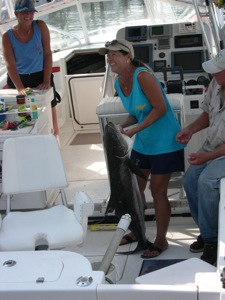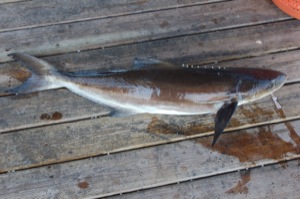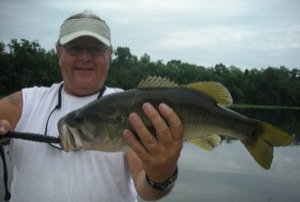
 |
|---|
| Helen Klenk tries to lift the cobia she caught while Gail Nelson and Evan Stein watch. |
“Hot, humid and a lot of rain” (and in some cases hail) equates to typical summer-time fishing weather. Also every July, and this year is no exception, we often get an upwelling of cold water due to the westerly winds blowing the warm surface water offshore and the colder water will start upwelling and bring about cold water and miserable fishing as well as beach conditions out to several miles.
Some people call it a Labrador Current, but it is not such. Divers have seen dead lobsters and Moray eels on the bottom. Fish hardly move and are an easy target for the unscrupulous diver. who tries to take his limit without any effort. That is not my kind of fishing.
The dolphin have moved north with only a few stragglers. The King Mackerel continue to be the main trolling fish - mostly on wrecks and artificial reefs. Cobia are under debris and loggerhead turtles and it you can approach within casting range of those big reddish brown shelled creatures, you can get a cobia or two into the boat. Barracuda are plentiful.
 |
|---|
| A fine dinner lying on the dock getting ready to be prepared. |
The bottom bite for vermillion and Lane snapper, back sea bass, trigger fish, and genuine American red snapper continues to be good if you can find a spot where the water is not cold. Otherwise amberjack are giving anglers great fights. A little deeper the gags and red grouper are being caught. Past the 28 fathom curve, big red porgies and snowy & scamp grouper have been boated.
In the surf whiting and bluefish seem to be the “thing “this past week. That was great news for the “Yankee Rich Brothers,” who spent a day surf fishing. Each of them had gone together to a local sporting good store and purchased fancy surf rods and reels unbeknownst to their wives. As time ended their day of surf fishing, these two sad fishermen had brought to the shore two small sharks, several sting rays, eight globs of sargassum weed and many empty hooks that they had used to feed the fish. However, they had released everything including the weed.
Rich A, looked at Rich C. and said: “What are you going to do for dinner tonight?” Rich C. replied, “My wife will have something”. Rich A. grumbled, “Well mine won’t. I promised the family a great fresh bluefish dinner (I apologize to any reader who just felt a wave of nausea come over them when they read that sentence; however, I must report the facts); but I can stop at a store and buy some. They will not know the difference.”
Two Publix and one Winn-Dixie store later, Rich A. came out empty-handed. Someone had suggested in one of the stores that he try a fish market. Once again he struck out, but decided to purchase a couple of small shark fillets, bemoaning the fact that he had released the small sharks that had been caught earlier.
 |
|---|
| Richard Colesanti proudly displays a Large Mouth Bass he caught in the St. John's River this week. |
As he entered the house carrying a small cooler, his wife was somewhat excited and enthusiastic to see what he had caught. After three decades of marriage she had learned well that if she did not stroke Rich A.’s ego when he returned home from his fishing adventures, he became impossible to live with for the next twelve hours.
Her façade of excitement suddenly turned to one of suspicion as she opened the lid of the cooler and gazed at his “catch”. With raised eyebrow she queried, “Why do you have two left sided filets, dear?” Rich A. responded, “Oh, honey, I know that I told you that I caught just one fish but in reality there were two. They both got dragged in and up on the beach on their right side and the sand and all those strong rip tides pretty much ripped off the whole right side of the fish. (Now where and how he came up with that one, I will never know.) “Well Ok, dear, how are you going to cook them?” his wife asked. “I have got a great new recipe with lots of garlic, pepper, and lots of spices. It will taste like no bluefish you have ever eaten before,” replied Rich A. as he thought – I will make that shark is so spicy nobody could tell what they are eating.
In the Inlet, Capt. Fred Robert reports the water temperature is in the mid-70s at the inlet. He also reports there are many Jack Crevalle and more bluefish. The word is out that the big Tarpon (
In the Halifax River, flounder, mangrove snapper, and Jack Crevalle are providing a lot of the action. Red drum are also being caught sporadically. Many disturbances on the water are being seen as the Jack Cravelle rip into the schools of pogies and mullet in the river. At night, the dock lights are still holding speckled trout.
In the lagoon redfish, gray snappers, Jack Crevalle and my buddy Dennis’ favorite fish – the mighty ladyfish – are providing anglers plenty of action. Most fish are being caught on shrimp and cut bait. There are a lot of crabs in the water.
In the Tomoka area, one must get out early because after it warms up, you are wasting your time” says Capt. Gibbens. There are reports of pompano and also reds and flounder. The same goers for the river but not too many pompano have been caught in the river. The FWC (Florida Fish and Wildlife Conservation Commission) is offering a no-cost, three hour, non-mandatory, preparatory class for alligator hunters. The 2008 statewide alligator hunting season runs from August 15 to November 1. Reservations are not needed for the class. Wile attendance is not mandatory for licensed hunters, the FWC recommends attendance especially if they have not hunted alligators previously.
Class topics will include hunt preparation, hunting techniques, safety, harvesting and processing, caring for your gator hide, and alligator hunting rules and regulations. Also invited to attend are members of the public who want to know what alligator hunting is all about. Classes will be offered on July 19 at the
www.sanfordflgov/recreation/facilities/civic_center.htm. Classes are also given in
All alligator hunting permits have been sold this year, however, alligator trapping “agent” permits are available for $52. Agent permits enable permit holders to assist a licensed trapper in taking alligators, but only in the presence of that trapper. Permitted alligator hunters can expect to receive their licenses and alligator hide –validation tags by
The 375 pound black bear that made worldwide news when a wildlife biologist, Adam Warrick, rescued it from drowning during a capture attempt will spend the remainder of his life in a zoo.
On July 7, 2008, less than two weeks after the FWC captured and relocated the black bear three times, the bear turned up again in a residential area of Horseshoe in Dixie County. The animal had traveled 110 miles from the spot where the FWC had released it into the Osceola National Forest
Initially the bear’s captors did not realize that it was the same bear that dashed into the water when hit with a tranquilizer dart at Alligator point in June. The bear, known to FWC as “Bear W007, would have probably drowned had it not been for the efforts of FWC biologist Warrick.
Tim Breault, director of the FWC’s Division of Habitat and Species Conservation said three unsuccessful attempts to relocate the bear from populated areas led officials to conclude the bear could not remain in the wild. “The bear has learned that populated areas are an easy source of food from garbage cans. Barbecue grills, pet food and, in some cases, deliberate feeding by residents. The potential threat to human safety from this bear is too great to allow it to continue to venture into populated areas. This is not a pleasant decision for us to have to make, but this is what happens when people feed bears or other wildlife. The only alternative is to euthanize the bear.” said Breault.
After contacting more than 20 zoos and other qualified facilities in a last ditch effort to find a home for the animal and spare its life, Wildlife Rescue and Rehab, Inc. agreed to take the bear, which be kept at the Hardee County Animal Refuge.
The FWC receives roughly 2000 calls regarding bears yearly. If the bear does not appear aggressive they are relocated to a remote area. Sometimes they continue to reappear in residential areas and have to be put down
For information of how to live in bear country go to www.myFWC.com/bear
It has been written;” If you want to catch a fish, you have to be in the spot where the fish is.” So whether you charter, ride a head boat, run your own vessel, stay in the river, surf fish, or fish from shore or a bridge- there are fish to be caught. Fishing is not a matter of life or death, it is so much more important than that.
Tight lines.
<*)/// /><
